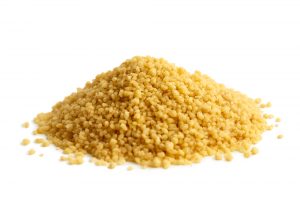Couscous is a delightful North African dish that magically replaces rice. Made with little semolina balls, it sublimes in your mouth with its creamy texture.

Couscous is widely used because it can be served with all types of vegetables, grains, meat, or seasonings and is pretty easy to boil.
When preparing this easy, peezy dish in your daily routine, you get concerned about how to reheat it when you store the leftover in the fridge.
Here we have a complete guide about reheating couscous, and we have also shared some fantastic tips about it. So, let’s start.
Contents
- How to Reheat Couscous
- How Much Water is Added in Couscous for Reheating?
- Reheating Couscous on a Stove
- Reheating Couscous in Microwave
- Reheating Couscous in a Boiling Bag
- Reheating Couscous in an Oven
- Does Reheating Couscous Alter its Taste?
- How to Refrigerate Couscous?
- How Long Couscous Last in a Refrigerator?
- Can You Eat Couscous Cold?
- Should You Thaw Couscous Before Reheating?
- Does Reheating Couscous Causes Food Poisoning?
- How to Check if Couscous is Bad?
- Can You Freeze Couscous?
- How Long Couscous Last in a Freezer?
- Final Verdict
How to Reheat Couscous
Reheating couscous is relatively easy. You can reheat it in a microwave, boiling bag, and even on the stove. Let’s discuss all these methods in detail step by step:
Before starting a discussion, remember that if your couscous is refrigerated, you must add some water to it before reheating because couscous gets stiff in the refrigerator.
But if you are going to reheat them some hours after cooking, then simply put the couscous in the microwave and heat it for 2 minutes.

How Much Water is Added in Couscous for Reheating?
You can add 2 to 3 tablespoons of water to 1 cup of couscous for reheating. You can also add more water to it if needed.
Reheating Couscous on a Stove
- Take a skillet and add 2 to 3 tablespoons of water to it. Also, add one teaspoon of oil to it.
- Keep the stove at medium heat and put the couscous in it.
- Stir the couscous very gently and carefully to avoid breaking granules.
- Start stirring from the skillet’s edges and gently move towards the middle.
- If you observe that stirring is breaking the granules, you can simply move the pan by its handle to move the granules.
- Stirring or moving the granules is crucial to avoid them from burning in the center.
- After your couscous gets evenly heated, get them out in a dish and serve with anything you want.
Reheating Couscous in Microwave
Many people come across this question: Can you reheat couscous in the microwave? So, the answer is yes. You can absolutely reheat couscous in a microwave oven by following these steps:
- Take a microwave-safe bowl and put the couscous in it.
- Add 2 to 3 tablespoons of water and heat it for 1 minute. There is no need to add oil for heating in a microwave.
- Stir the couscous to ensure proper heating and put it again in the microwave until smoke starts rising from it.
Note:
If your couscous is frozen, then the ice in it will melt while reheating. So, don’t add water in the beginning. Add it later if required.
Reheating Couscous in a Boiling Bag
If you have a boiling bag in your home, you can try this method to reheat couscous.
- Take a boiling bag and add couscous to it.
- Keep the heat of the stove medium or low.
- Shake the bag 3 to 4 times while heating to ensure an even heat transfer.
- Keep on checking the granules. They should remain bouncy and intact.
Reheating Couscous in an Oven
Reheating couscous in a microwave is very time-consuming, but the final texture you get by this method is the best. Granules of couscous don’t get mushy in the oven. So, you can use this method if you want perfectly reheated couscous.
- Preheat your oven to 350 degrees Fahrenheit.
- Put your couscous in the oven with a lid over it to avoid drying out.
Does Reheating Couscous Alter its Taste?
You will probably feel a minor difference in taste between freshly cooked and reheated couscous. But if you refrigerate and reheat it the right way, you will experience the same fresh flavor.

How to Refrigerate Couscous?
Here we have explained the correct method of refrigerating the couscous, so you get the same fresh pleasure after reheating.
- Put the couscous in a clean airtight container.
- Cover the container with an airtight lid or a plastic sheet. You can also use aluminum foil. It avoids any dirt or air reaching your ingredients.
- Put a label on the container and write the name of the ingredients and the date on it.
How Long Couscous Last in a Refrigerator?
Couscous remains fresh for 3 to 4 days in a refrigerator.
Can You Eat Couscous Cold?
Yes, you can eat couscous cold as it tastes delicious. Heating is mainly preferred to kill all microorganisms, but if you have stored couscous hygienically, it is totally safe to enjoy your couscous cold.
Should You Thaw Couscous Before Reheating?
If you had refrigerated your couscous, it is unnecessary to thaw it before reheating. But if you have frozen your couscous, you should thaw it to melt the ice crystals.
Does Reheating Couscous Causes Food Poisoning?
No, reheated couscous is safe to eat and doesn’t cause food poisoning or other health problems. Keep the following precautions in your mind:
- Store couscous in the refrigerator or freezer correctly and hygienically.
- Don’t keep cooked couscous at room temperature for so long because bacterial action spoils it by producing toxins.
If you feel any symptoms of spoilage, then don’t eat it.
How to Check if Couscous is Bad?
You can check couscous’ freshness by following signals:
- If it smells terrible and rancid.
- If it tastes peculiar.
- If you notice some mold or tiny insects in it.
- If it had been in the fridge for more than a week.
Can You Freeze Couscous?
Yes, you can freeze your couscous if you don’t want to use it within a week. Follow the proper steps to keep it fresh and hygienic.
How Long Couscous Last in a Freezer?
Couscous remains fresh for 12 months in a freezer if stored properly. But we recommend you to consume it sooner.
Final Verdict
Couscous gives different delight to your taste buds and also brings immense nutritional value to you. So, storing and reheating them remains a significant concern for you. You can easily reheat it by following the steps we have explained. Hope you have got the answers to all your queries above.

Leave a Reply